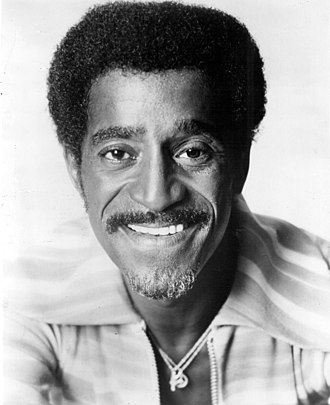Discover Your Roots
SIGN UPDiscover Your Roots
SIGN UPSammy is a gender-neutral name of English origin, serving as a diminutive form of either Samuel or Samantha. It is a popular nickname for individuals with these given names. In addition, Sammy is also an English variant of the Arabic name Sami. The name holds significance in various fields, with notable individuals in music, sports, and other sectors bearing this name. From American rapper Sammy Adams to legendary singer Sammy Davis Jr., and from footballer Sammy Adjei to Japanese wrestler Sammy Lee, the name has left its mark across different domains. Even fictional characters and businesses have been associated with the name Sammy. This versatile name has a rich history and continues to be embraced by people worldwide.

Samuel George Davis Jr. (December 8, 1925 – May 16, 1990) was a multifaceted American entertainer known for his talents as a singer, actor, comedian, dancer, and musician. He began his career at a young age, performing in Vaudeville alongside his father Sammy Davis Sr. and the Will Mastin Trio. Davis' film career started in 1933, and after serving in the military, he returned to the trio and gained widespread acclaim following his nightclub performances. Notably, he faced challenges and prejudice throughout his life, including losing his left eye in a car accident, converting to Judaism, and confronting societal backlash for his interracial relationships. Despite these obstacles, Davis achieved significant success in various entertainment spheres, including Broadway, film, television, and music. He broke racial barriers in the entertainment industry and became a symbol of resilience and talent. Davis received numerous accolades, including the Spingarn Medal, a Golden Globe Award nomination, an Emmy Award nomination, and the Grammy Lifetime Achievement Award posthumously. His impact on the entertainment world is recognized through his induction into the National Rhythm & Blues Hall of Fame in 2017. Samuel George Davis Jr.'s legacy continues to inspire and influence the entertainment industry.

Sam Roy Hagar, also known as the Red Rocker, is an American singer, songwriter, guitarist, entrepreneur, and philanthropist. Rising to fame in the early 1970s with the hard rock band Montrose, he later achieved success as a solo artist and as the lead vocalist of Van Halen. Known for hits like "I Can't Drive 55," Hagar's musical style primarily consists of hard rock and heavy metal. Beyond music, he is a successful entrepreneur, having founded four spirits brands and 13 restaurants. Alongside his wife, Kari Hagar, he established the Hagar Family Foundation, a private non-profit focused on children's causes and hunger relief. Born on October 13, 1947, in Salinas, California, Hagar's upbringing was marked by family struggles, including his father's alcoholism and abusive behavior. Despite these challenges, Hagar's passion for music led him to achieve great success in the music industry, making him a respected figure in rock and roll history.

Samuel Adrian Baugh, also known as "Slingin' Sammy," was a prominent American professional football quarterback who made a significant impact in the National Football League (NFL). Born on March 17, 1914, in Temple, Texas, Baugh's athletic prowess and versatile skills led to a remarkable career. He played college football for the TCU Horned Frogs, earning All-American titles and leading his team to victorious bowl game wins. Baugh's exceptional abilities attracted the attention of the Washington Redskins, where he excelled as a quarterback, punter, and safety. Throughout his 16-season tenure with the Redskins, Baugh achieved numerous accolades, including NFL Championships and leading the league in various statistical categories. His talent and strategic gameplay solidified his legacy as a football legend.Baugh's achievements extended beyond his playing career, as he transitioned to coaching and continued to contribute to the sport's development. His remarkable contributions to football were duly recognized with his induction into the Pro Football Hall of Fame in 1963. Additionally, Baugh's impact on the sport was commemorated through his inclusion in the NFL's 75th and 100th Anniversary All-Time teams. His remarkable journey from a high school quarterback to a revered NFL icon solidifies his enduring influence on the sport of football.

Samuel "Sammy" Fabelman is the central character in Steven Spielberg's semi-autobiographical film "The Fabelmans." The story follows the journey of a young American Jewish teenager who aspires to be a filmmaker, loosely based on Spielberg himself. Portrayed by Gabriel LaBelle and Mateo Zoryan Francis-DeFord at different ages, Sammy is the eldest son of the Fabelman family, with his parents Mitzi and Burt, and his three younger sisters. The film chronicles Sammy's passion for movies, his family's relocations due to his father's job, and the challenges he faces, including heartbreak and antisemitism. The character of Sammy is inspired by Spielberg's own experiences, with elements of fiction added for originality. The family dynamics and influential figures in Sammy's life draw from Spielberg's personal relationships, creating a captivating narrative that mirrors the acclaimed director's formative years. The character's journey resonates with themes of passion, perseverance, and familial support, ultimately culminating in a poignant realization and a renewed commitment to pursuing his dream.

Sammy Basso (1 December 1995 – 5 October 2024) was an Italian biologist and a remarkable figure in the study of progeria, a rare genetic disorder that accelerates aging. Diagnosed with progeria at the age of 2, he became one of the oldest known survivors of the disease and dedicated his life to advancing research and understanding of this condition. Despite the challenges, Basso pursued education and earned a master's degree in molecular biology, contributing significantly to research efforts aimed at treating progeria. He actively participated in clinical trials and played a crucial role in the discovery of the gene affected by the mutations responsible for progeria. Basso's contributions led to the development of an experimental drug, Lonafarnib, which showed potential in slowing down the progression of the disease. His dedication and impact on progeria research have left a lasting legacy in the scientific community. Basso passed away on 5 October 2024 at the age of 28, leaving behind a vibrant and engaged spirit that inspired many. His remarkable achievements and unwavering determination continue to inspire future generations in the field of progeria research and beyond.
All images displayed on this page are sourced from Wikipedia or Wikimedia Commons.We use these images under their respective Creative Commons or public domain licenses. Wherever applicable, author attributions and license information are provided. If you believe an image is used incorrectly or outside its license terms, please contact us so that we can review and correct the issue.